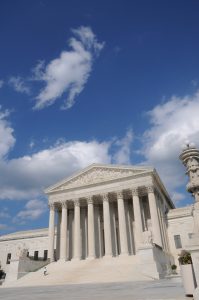By Adam Mossoff
 In an important decision handed down today, the Supreme Court explicitly recognized that patents are property secured by the Fifth Amendment Takings Clause. In Horne v. Department of Agriculture, the Court held that the Takings Clause imposes a “categorical duty” on the government to pay just compensation whether it takes personal or real property. This overruled the Ninth Circuit, which had held that personal property receives less protection under the Takings Clause than real property.
In an important decision handed down today, the Supreme Court explicitly recognized that patents are property secured by the Fifth Amendment Takings Clause. In Horne v. Department of Agriculture, the Court held that the Takings Clause imposes a “categorical duty” on the government to pay just compensation whether it takes personal or real property. This overruled the Ninth Circuit, which had held that personal property receives less protection under the Takings Clause than real property.
Chief Justice Roberts, writing for the Court, noted the long history of private property being secured against uncompensated takings by the government, beginning with the Magna Carta some 800 years ago. In further support, Roberts cited a Supreme Court opinion from the late nineteenth century:
Nothing in this history suggests that personal property was any less protected against physical appropriation than real property. As this Court summed up in James v. Campbell, 104 U.S. 356, 358 (1882), a case concerning the alleged appropriation of a patent by the Government:
“[A patent] confers upon the patentee an exclusive property in the patented invention which cannot be appropriated or used by the government itself, without just compensation, any more than it can appropriate or use without compensation land which has been patented to a private purchaser.”
I am pleased to see the Supreme Court reiterate what it said over a century ago: A patented invention stands the same as other types of property, and its taking by the government without adequate compensation is unconstitutionally unjust.
James Madison, the author of the Takings Clause, once wrote: “Government is instituted to protect property of every sort.” The Court’s decision today vindicates Madison’s intent to limit the government’s power to take property, both personal and real, without just compensation. And it extends a long line of cases recognizing that “property” in the constitutional sense subsumes all things arising from labor and invention.
Today’s opinion confirms my own historical research that has revealed deep flaws in the current conventional wisdom that early courts did not protect patents as constitutional private property under the Takings Clause. And it validates the point made in the amicus brief I signed onto with other property law professors that the Takings Clause applies with equal force to both personal and real property.
I applaud the Court for recognizing that intangible property such as patents deserve constitutional protection the same as any other type of property. Since the Founding of our great nation, this has always been true, and today’s decision helps guarantee that it will continue to be true for the centuries yet to come.

